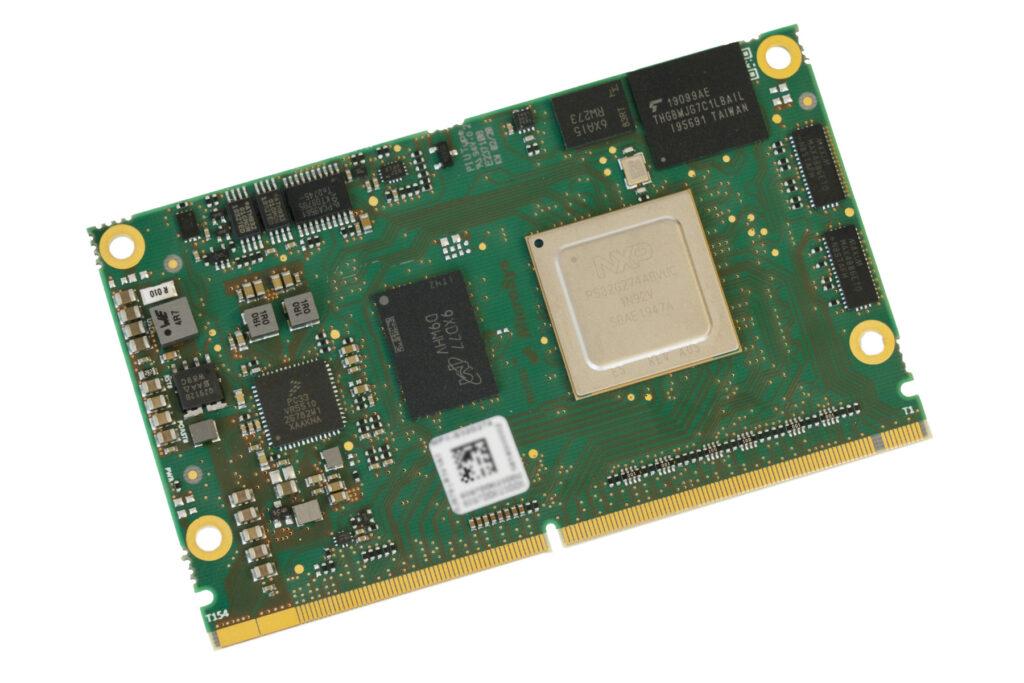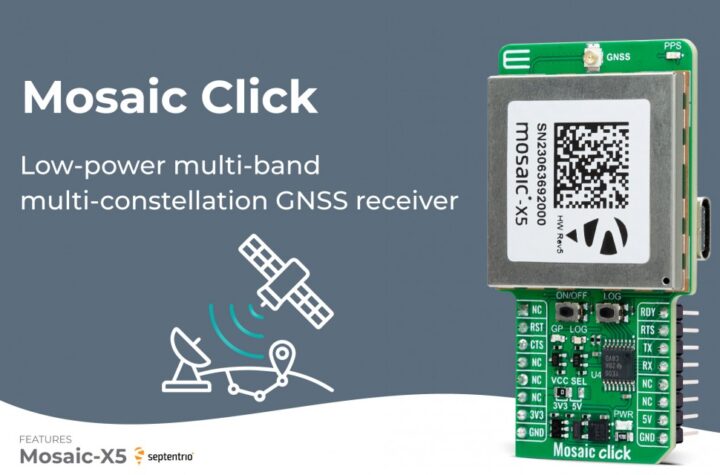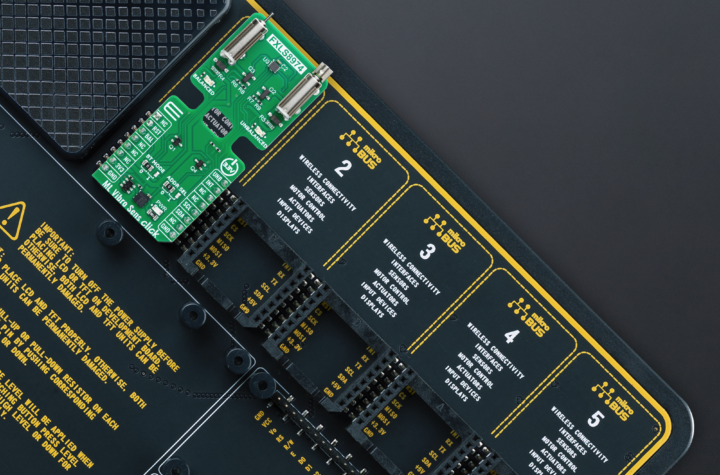
MicroSys Electronics announces the world’s first System-on-Module (SoM) with NXP Semiconductors S32G274A processor. The miriac MPX-S32G274A SoM comes with quad Arm Cortex-A53 cores plus triple Arm Cortex-M7 dual-cores and combines ASIL D safety and hardware security with more than 10 times the real-time performance and networking throughput of NXP’s previous automotive gateway devices[1]. The SoM offers multiple native CAN interfaces as well as comprehensive FlexRay, LIN and Ethernet support. Target markets are real-time connected vehicles, mobile machinery and automotive test and measurement equipment. Further applications include data loggers, edge gateways and fail-safe programmable logic controllers (PLCs).
With native support for a total of 18 CAN interfaces, the new MicroSys SoM is ideal for developing comprehensive vehicle networks. Alternative designs that use generic expansion buses to connect CAN controllers generate high interrupt loads on the main processor. FPGAs are not an inexpensive alternative either; they also require additional development resources for FPGA programming.
“The MicroSys miriac MPX-S32G274A is the world’s first System-on-Module to integrate the new NXP S32G2 processor, which was developed specifically for vehicle networks. OEMs benefit from an application-ready building block for their connected real-time controllers in automotive and other functional safety applications. They also benefit from high computing performance, faster Ethernet and automotive connectivity including massive native CAN support, plus comprehensive functional safety and security features,” explains Ina Sophia Schindler, CEO of MicroSys Electronics.
“System-on-Modules such as the MicroSys miriac MPX-S32G274A SoM help engineers to accelerate their designs by allowing them to concentrate on the application development. It is way easier and more efficient to implement an application-ready super component including processor, RAM, and flash than to re-invent the wheel and start with a full-blown custom design from scratch,” explains Carlos Prada, Global Partner Director at NXP Semiconductors.
Beside application-ready hardware and function-validated hardware-related software, MicroSys Electronics also offers customer-specific carrier boards and system level design services. These extend to SIL certification for any markets where functional safety standards analog to IEC 61508 are required, including railway technology (EN 50155), aviation (DO-160), stationary and mobile machinery (ISO 13849), as well as manufacturing robots (ISO 10218), control systems (IEC 62061), and drive systems (IEC 61800 5 2). Approvals in the aviation context (DO-254/DO-160) are also greatly simplified by the existing manufacturer documentation.
In all these application areas, the new MicroSys SoM provides value with its AEC-Q100 Grade 2 (-40°C to 105°C) qualified processor. The Low Latency Communication Engine (LLCE) for automotive networks, which is optimized for data transfers, as well as its Packet Forwarding Engine (PFE) for Ethernet networks, greatly reduce the CPU workload. A Hardware Security Engine (HSE) for secure boot and encrypted data transfer provides the required comprehensive root of trust for connected IoT edge devices.
The feature set in detail
The miriac MPX-S32G274A SoM from MicroSys Electronics features 1 GHz quad Arm Cortex-A53 cores with Arm Neon technology organized in two clusters for applications and services. For real-time tasks, there are also triple dual-core lockstep Arm Cortex-M7 cores for which MicroSys offers support for dedicated FreeRTOS implementations beside NXP’s standard automotive support. Clustered and operated in lockstep mode, this set of heterogenous cores can support ASIL-D applications or any other functional safety standard comparable to IEC 61508. In terms of memory, the new SoM integrates 4GB of soldered LPDDR4 RAM at 3200 MT/s, 16GByte eMMC non-volatile memory, and 64MB QuadSPI flash. External SD card storage can be multiplexed with the on-board eMMC.
In regard to connectivity, the new SoM offers an extensive range of generic and communication interfaces including 4x SerDes interfaces configurable as PCIe Gen3 2×1 or 2×2, 4x Gigabit Ethernet, 18x CAN FD bus, 2x FlexRay, and 4x LIN. 14x GPIOs, 12x analog inputs (ADC), 3x SPI, 2x UART, 1x USB and 3x I2C complete the interface range. For trace and debug tasks, the SoM supports Aurora and JTAG interfaces. A comprehensive board support package including bootloader configuration and all required Linux drivers rounds off the feature set.
The new MPX-S32G274A SoM from MicroSys Electronics is available as an application-ready off-the-shelf component as well as a development kit with carrier board, cable set and cooling solution. For more information, please visit: https://microsys.de/products/s
About MicroSys Electronics
MicroSys Electronics has been designing and developing embedded system solutions since 1975, is an NXP® Gold Partner and widely integrates NXP®’s S32 Automotive, Layerscape® and QorIQ® processor technology. Designs based on System-on-Modules (SoMs) are the strengths of this German company, with the portfolio ranging from application-ready SoMs and customer-specific carrier board designs to fully integrated systems. Application areas for these extremely rugged designs with long-term availability are primarily found in markets where safety standards analog to IEC 61508 are required, such as railway technology (EN 50155), aviation (DO-160), and mobile machinery (ISO 13849), as well as manufacturing robots (ISO 10218), control systems (IEC 62061), and drive systems (IEC 61800-5-2). Further application areas can be found in medical technology (60601), and in critical infrastructures, for instance in the nuclear sector (IEC 61513) or the process industry (IEC 61511). MicroSys works closely with its customers in all these industries to ensure that the specific applicable standards are fully met. For more information, visit https://microsys.de/















More Stories
Mosaic Click board from MIKROE delivers global coverage multi-band and multi-constellation tracking ability
Current transducer from Danisense selected for DC charging station testing device demonstrator at TU Graz
New Click board from MIKROE helps develop and train ML models for vibration analysis